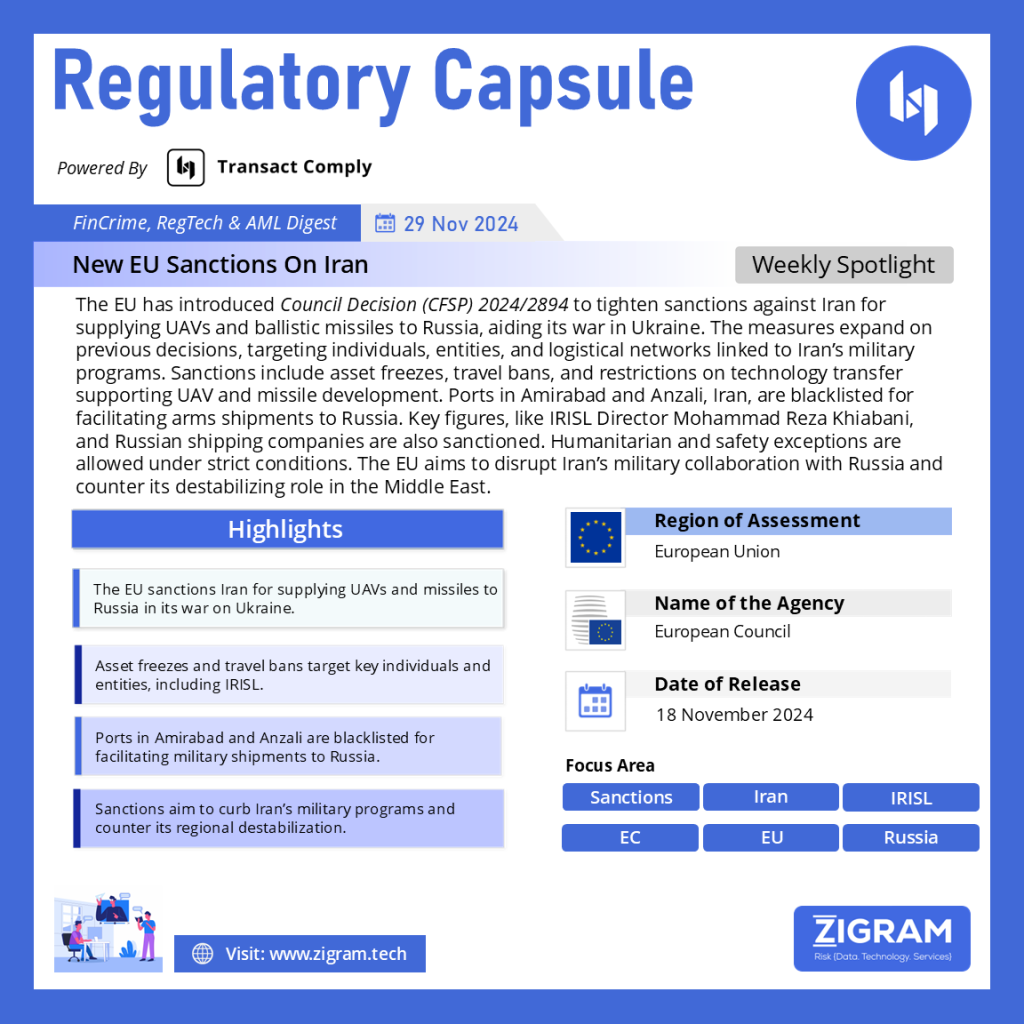Regulation Name: EU Sanctions On Iran Council Decision (CFSP) 2024/2894
Publishing Date: 18 November 2024
Region: European Union
Agencies: European Council
November 2024 – In a decisive move, the European Union (EU) has introduced enhanced restrictive measures against Iran through Council Decision (CFSP) 2024/2894. This amendment to the earlier Decision (CFSP) 2023/1532 addresses Iran’s continued military support to Russia in its war against Ukraine and its destabilizing activities in the Middle East and Red Sea regions. The EU’s actions underscore its commitment to countering threats to European security and maintaining international law.
Background: Iran’s Role in the Russia-Ukraine Conflict
The EU’s measures come amid mounting evidence of Iran supplying unmanned aerial vehicles (UAVs) and ballistic missiles to Russia. These weapons have been used in relentless attacks on Ukrainian civilians and infrastructure. Iran’s military assistance not only escalates the conflict but also directly violates Ukraine’s sovereignty, independence, and territorial integrity.
In March 2024, the European Council warned of significant consequences if Iran continued transferring ballistic missile technology to Russia. This decision follows through on that warning by targeting key individuals, entities, and logistics networks linked to Iran’s military programs.
Key Highlights of the Sanctions
The new measures include comprehensive restrictions aimed at curbing Iran’s UAV and missile development capabilities and the logistical networks supporting these efforts:
1. Prohibition on Technology Transfer:
o A blanket ban on the export, supply, or sale of components or technology that could support Iran’s UAV and missile programs, even if originating outside the EU.
2. Asset Freezes and Travel Restrictions:
o Funds and economic resources belonging to designated individuals and entities have been frozen.
o Travel restrictions imposed on individuals involved in Iran’s military logistics, including the supply chain for UAVs and missiles.
3. Targeted Entities and Individuals:
o Mohammad Reza Khiabani, Director of the Islamic Republic of Iran Shipping Lines (IRISL), was sanctioned for his involvement in transporting military cargo linked to the Iranian Revolutionary Guard Corps Navy (IRGCN).
o Russian shipping companies, including MG Flot LLC, VTS Broker LLC, and Arapax LLC, were designated for their roles in transferring Iranian military equipment to Russia.
o The IRISL was also sanctioned as Iran’s national maritime carrier, accused of converting its container ships into drone carriers for military purposes.
4. Port Restrictions:
o Ports in Amirabad and Anzali, Iran, have been listed under sanctions due to their use in transferring Iranian-made military equipment to Russia.
5. Humanitarian and Safety Exceptions:
o Specific exemptions have been carved out for humanitarian emergencies, maritime safety, and diplomatic missions. These exceptions are carefully monitored to prevent misuse.
Broader Implications
The sanctions highlight the EU’s dual objectives: to curtail Iran’s military collaboration with Russia and to limit its influence in other conflict zones. Iran’s UAV and missile programs, supported by state and private enterprises, have been linked to armed groups in the Middle East and Red Sea regions, further exacerbating instability.
The measures also emphasize the EU’s alignment with international partners to restrict Russia’s access to battlefield technologies. By targeting logistical hubs and shipping companies, the EU aims to disrupt supply chains critical to the Iran-Russia nexus.
Moving Forward
The decision reflects the EU’s broader strategy to uphold international law and deter state actors from undermining peace and security. The sanctions will be kept under review, with the possibility of suspension, withdrawal, or augmentation based on developments on the ground.
Josep Borrell Fontelles, High Representative for Foreign Affairs and Security Policy, stated, “This is a firm response to Iran’s continued military collaboration with Russia and its disregard for international law. The EU remains resolute in its efforts to defend European security and support Ukraine’s sovereignty.”
As geopolitical tensions persist, the EU’s decision serves as a stark reminder of the consequences of violating international norms. The international community will be watching closely to see how these measures influence the dynamics of the ongoing conflicts in Ukraine and the Middle East.
Read the details here.
Read about the product: Transact Comply
Empower your organization with ZIGRAM’s integrated RegTech solutions – Book a Demo
- #EUSanctions
- #IranRussiaConflict
- #UkraineWar
- #UAVSanctions
- #GlobalSecurity
- #MiddleEastTensions
- #AssetFreeze
- #InternationalLaw
